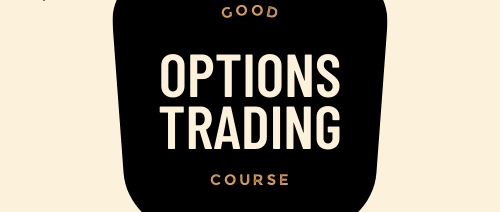Options Trading Course
Which is the best options trading course


A good options trading course should cover the following topics:
Options basics: The course should start with the basics of options, including definitions of terms like calls, puts, strike prices, expiration dates, and option premiums.
Options trading strategies: The course should cover the different types of options trading strategies, including basic strategies like buying calls and puts, as well as more advanced strategies like spreads, straddles, and strangles.
Risk management: The course should emphasize the importance of risk management and teach students how to manage risk in their options trades, including using stop losses, position sizing, and diversification.
Technical analysis: The course should cover technical analysis tools that can be used in options trading, such as chart patterns, indicators, and oscillators.
Fundamental analysis: The course should also cover fundamental analysis tools that can be used to evaluate the underlying stock or asset that the options are based on, such as earnings reports, news events, and financial ratios.
Trading psychology: The course should address the importance of having a disciplined and rational approach to trading, including avoiding emotional trading decisions and maintaining a long-term perspective.
Brokerage platform and tools: The course should cover the different options trading platforms and tools available, and provide guidance on how to choose the best one for individual trading needs.
Practical applications: The course should include real-life examples and case studies of options trades, so students can see how the concepts learned in the course are applied in actual trading situations.
Continuous learning: Finally, the course should emphasize the importance of continuous learning and provide resources for further education and development in the field of options trading.
What you should consider before you sign up for an options trading course?
Here are some factors to consider when evaluating a good options trading course online:
Instructor expertise: The instructor of the course should have a proven track record in options trading and be able to demonstrate their expertise through their own trading history or other credentials.
Course content: The course content should cover all the essential topics in options trading, as described in my previous response. It should be well-structured and easy to follow, with plenty of practical examples and case studies.
User reviews and testimonials: It's important to read user reviews and testimonials of the course to get an idea of the experiences of other students who have taken the course. Look for reviews that are detailed and provide specific examples of how the course helped them.
Cost: The cost of the course should be reasonable and reflect the value of the content provided. It's important to be wary of courses that seem too expensive or too cheap compared to other options trading courses available.
Support and resources: The course should provide adequate support and resources for students, such as access to a community of traders or additional educational materials. Look for courses that offer ongoing support and resources beyond the initial course material.
Accessibility: The course should be accessible and easy to use, with a user-friendly interface and clear instructions for accessing and navigating the course material.
Time commitment: Consider the amount of time required to complete the course and whether it fits with your own schedule and trading goals. Some courses may require a significant time commitment, while others may be more flexible.
Overall, a good options trading course should provide a comprehensive and practical education in options trading, with a focus on instructor expertise, course content, user reviews and testimonials, cost, support and resources, accessibility, and time commitment.
